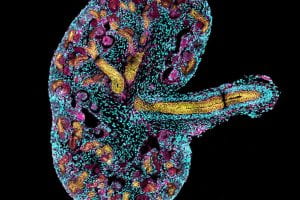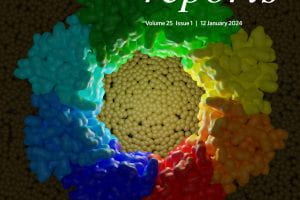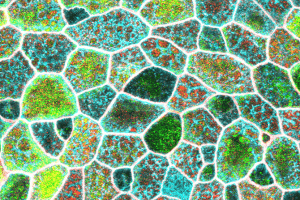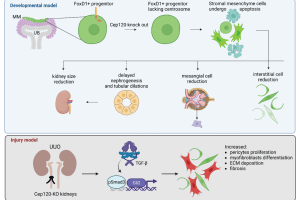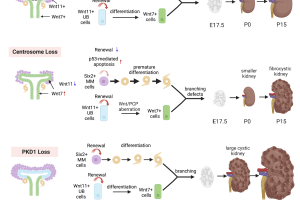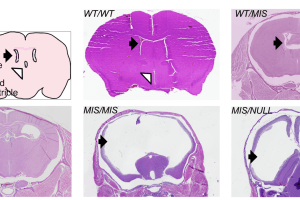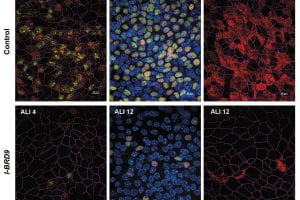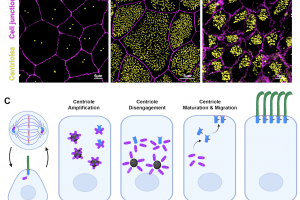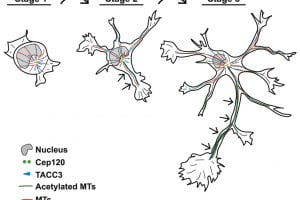Tao’s paper is published in JCI Insight… and Ewa’s pic made the cover!!
Autosomal dominant polycystic kidney disease (ADPKD) is a monogenic disorder accounting for approximately 5% of patients with renal failure, yet therapeutics for the treatment of ADPKD remain limited. ADPKD tissues display abnormalities in the biogenesis of the centrosome, a defect that can cause genome instability, aberrant ciliary signaling, and secretion of pro-inflammatory factors. Cystic cells […]
Ewa’s paper is published in EMBO Reports!
Mutations in genes that disrupt centrosome structure or function can cause congenital kidney developmental defects and lead to fibrocystic pathologies. Yet, it is unclear how defective centrosome biogenesis impacts renal progenitor cell physiology. Here, we examined the consequences of impaired centrosome duplication on kidney stromal progenitor cell growth, differentiation, and fate. Conditional deletion of the […]
Tao’s paper is published in Development!
Mutations that disrupt centrosome biogenesis or function cause congenital kidney developmental defects and fibrocystic pathologies. Yet how centrosome dysfunction results in the kidney disease phenotypes remains unknown. Here, we examined the consequences of conditional knockout of the ciliopathy gene Cep120, essential for centrosome duplication, in the nephron and collecting duct progenitor niches of the mouse […]
Ewa and Tao’s manuscripts are accepted!
Congrats to Ewa and Tao for having their papers accepted for publication in EMBO Reports and Development, respectively!
A big welcome to our new Summer Scholar Arushi Katyal!
Arushi is a sophomore at Boston College, and is joining the lab for 2 months as part of the WU Pediatric Center of Excellence in Nephrology (PCEN) Summer Scholar program. She will be investigating how defects in centrosome biogenesis affect the immune response during embryonic kidney development. Welcome to the lab!
Ewa’s new preprint about the effects of Cep120/centrosome loss in the kidney stromal progenitors is now on bioRxiv
Reciprocal signaling between progenitor cells of the stromal mesenchyme (SM), metanephric mesenchyme and ureteric bud is critical for proper mammalian kidney morphogenesis. Several of these signaling pathways are regulated by the centrosome, and its associated structure the primary cilium. Mutations in genes that disrupt centrosome biogenesis or function cause congenital kidney developmental defects and lead […]
Tao’s new preprint on the consequences of Cep120/centrosome loss in nephron progenitors during kidney development is now on bioRxiv
Mutations that disrupt centrosome structure or function cause congenital kidney developmental defects and fibrocystic pathologies. Yet, it remains unclear how mutations in proteins essential for centrosome biogenesis impact embryonic kidney development. Here, we examined the consequences of conditional deletion of a ciliopathy gene, Cep120, in the two nephron progenitor niches of the embryonic kidney. Cep120 loss led to […]
New collaboration with WU Ciliopathy Group colleagues on DNAAF5 gene dosage is published in JCI Insight
DNAAF5 is a dynein motor assembly factor associated with the autosomal heterogenic recessive condition of motile cilia, primary ciliary dyskinesia (PCD). The effects of allele heterozygosity on motile cilia function are unknown. We used CRISPR-Cas9 genome editing in mice to recreate a human missense variant identified in patients with mild PCD and a second, frameshift […]
Our collaboration on roles of GEMC1/MCIDAS during multiciliogenesis is published in Cell Death and Disease
Multiciliated cells (MCCs) project dozens to hundreds of motile cilia from their apical surface to promote the movement of fluids or gametes in the mammalian brain, airway or reproductive organs. Differentiation of MCCs requires the sequential action of the Geminin family transcriptional activators, GEMC1 and MCIDAS, that both interact with E2F4/5-DP1. How these factors activate […]
Moe, Megan and Tao attend the FASEB Cilia 2022 conference
Tao Cheng gave a wonderful talk titled “Developmental defects caused by centrosome dysfunction during kidney morphogenesis”.
Our review titled “Development of a Multiciliated Cell” is published in Current Opinion in Cell Biology!
Multiciliated cells (MCC) are evolutionary conserved, highly specialized cell types that contain dozens to hundreds of motile cilia that they use to propel fluid directionally. To template these cilia, each MCC produces between 30 and 500 basal bodies via a process termed centriole amplification. Much progress has been made in recent years in understanding the […]
Our collaboration on the role of Cep120 in axon development is published in Cell Reports
Microtubule (MT) modifications are critical during axon development, with stable MTs populating the axon. How these modifications are spatially coordinated is unclear. Here, via high-resolution microscopy, we show that early developing neurons have fewer somatic acetylated MTs restricted near the centrosome. At later stages, however, acetylated MTs spread out in soma and concentrate in growing […]
